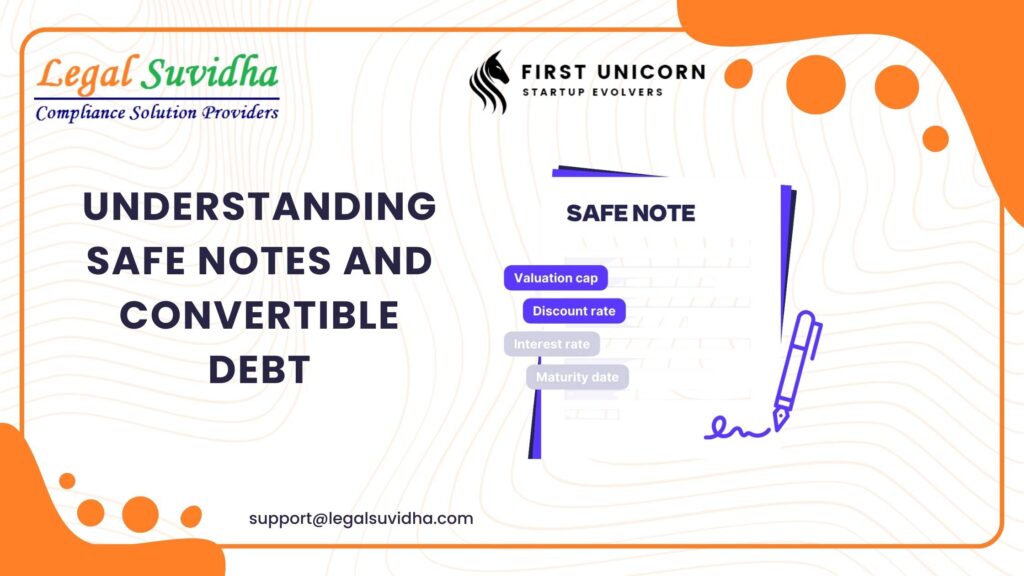Understanding SAFE Notes and Convertible Debt
When startups seek funding, they often turn to alternative investment vehicles like SAFE notes and convertible debt. Both of these instruments are designed to help startups raise capital without immediately determining the valuation of the company, which is a common challenge for early-stage businesses. While they are both convertible securities, they differ in key ways, such as the terms of conversion, interest payments, and the risk to investors.
In this detailed explanation, we will explore SAFE notes and convertible debt, how they work, and the pros and cons of each from the perspective of both startups and investors.
1. What are SAFE Notes?
A SAFE (Simple Agreement for Future Equity) note is a relatively new investment instrument, introduced by Y Combinator in 2013. It is an agreement between a startup and an investor that provides the investor with the right to receive equity (shares in the company) in the future. This happens when certain conditions are met, such as a subsequent financing round, acquisition, or IPO.
Key Features of SAFE Notes:
- No Debt: Unlike traditional loans, a SAFE is not considered debt, so it does not require interest payments or a repayment schedule.
- Conversion to Equity: The SAFE note converts into equity at a future date, usually at a discount or with a valuation cap.
- No Set Repayment Date: Since it’s not a loan, the startup doesn’t need to worry about repaying the SAFE note at a specific time, which makes it less burdensome on cash flow.
- Investor Rights: SAFE investors do not have voting rights, and their investment is usually subject to the terms of the next financing round.
How It Works:
When the company raises a subsequent round of funding, the SAFE investor’s investment converts into equity based on the valuation at that time, but with favorable terms (like a discount or valuation cap) that benefit the SAFE investor.
Pros of SAFE Notes:
- Simplicity: The terms of a SAFE note are much simpler and more straightforward than traditional equity financing agreements, making the process faster and cheaper.
- No Debt Burden: There’s no need to worry about interest payments or repayment schedules.
- Faster Fundraising: SAFEs allow startups to raise capital quickly since they don’t require lengthy negotiations on valuation or debt terms.
- Investor Incentives: Discounts and valuation caps offer favorable terms to investors.
Cons of SAFE Notes:
- No Immediate Ownership: Investors don’t receive equity immediately and lack voting rights until conversion.
- Uncertain Valuation: Both parties are uncertain about future conversion terms.
- Investor Risk: SAFEs may not convert if no subsequent round occurs.
- Dilution Risk: Founders face dilution when the SAFE converts into equity.
2. What is Convertible Debt?
Convertible debt (also known as a convertible note) is a type of short-term loan that converts into equity at a later stage, typically during the startup’s next funding round. Like a SAFE note, the investor’s loan will convert into equity rather than being repaid in cash, but convertible debt comes with some key differences, particularly in terms of interest rates and repayment terms.
Key Features of Convertible Debt:
- Debt with Interest: Convertible debt is technically a loan, so it carries an interest rate (typically around 5-8% annually).
- Maturity Date: Unlike SAFE notes, convertible debt agreements usually have a maturity date (typically 1-3 years).
- Convertible into Equity: The loan amount (principal plus interest) converts into equity at a future round of funding.
- Convertible Debt vs. Traditional Loans: Investors expect equity, not cash repayment.
How It Works:
Convertible debt typically works by allowing investors to lend money to the startup with the understanding that, upon the occurrence of a triggering event (such as the next round of funding), the amount invested (plus accrued interest) will convert into equity at a favorable price (with a discount or cap).
3. Key Differences Between SAFE Notes and Convertible Debt
| Aspect | SAFE Notes | Convertible Debt |
|---|---|---|
| Nature | Not a loan, no interest payments | Debt instrument with interest payments |
| Repayment | No repayment obligation | Must be repaid if not converted by maturity |
| Interest | No interest | Carries interest (5-8% annually) |
| Maturity Date | No maturity date | Has a set maturity date |
Looking for Startup Funding/Grant/Loan for your Business? Fill out the form today
https://forms.gle/R7t7zTQGjiKEFEu86










